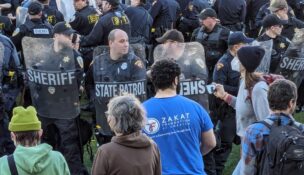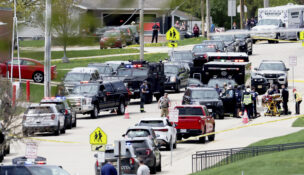US Supreme Court split on scope in Wisconsin absentee ballot opinion
By: Michaela Paukner, [email protected]//April 8, 2020//
US Supreme Court split on scope in Wisconsin absentee ballot opinion
By: Michaela Paukner, [email protected]//April 8, 2020//
A decision from the U.S. Supreme Court about Wisconsin’s April 7 election saw the justices split on the scope of the issue in question: whether absentee ballots could be postmarked after election day.
The decision followed a separate one by the Wisconsin Supreme Court finding that the April 7 election would proceed as scheduled. Shortly after, the U.S. Supreme Court blocked Democratic efforts to extend absentee voting.
The U.S. Supreme Court considered whether ballots must be postmarked by April 7, as state law would necessarily require, or if they could be postmarked after election day, as long as they were received by April 13.
In a 5-4 vote, the Supreme Court ruled that absentee ballots must be postmarked by April 7. Chief Justice John Roberts and Justices Brett Kavanaugh, Clarence Thomas, Neil Gorsuch and Samuel Alito made up the majority.
In the opinion, the majority said the question before the court was a narrow, technical question about the absentee-ballot process, not the wisdom of the decision to proceed with the April 7 election.
“The Court’s decision on the narrow question before the Court should not be viewed as expressing an opinion on the broader question of whether to hold the election, or whether other reforms or modifications in election procedures in light of COVID–19 are appropriate,” the majority wrote.
The majority said the “critical point in the case” was that the plaintiffs, which included the state and national Democratic parties and other liberal groups, had not asked that the District Court allow ballots mailed and postmarked after April 7 to be counted. The majority viewed the request as one that “fundamentally alters the nature of the election.”
“By changing the election rules so close to the election date and by affording relief that the plaintiffs themselves did not ask for in their preliminary injunction motions, the District Court contravened this Court’s precedents and erred by ordering such relief,” the majority wrote.
Justice Ruth Bader Ginsburg wrote the dissenting opinion and was joined by Justices Stephen Breyer, Sonia Sotomayor and Elena Kagen. Ginsburg called the categorization of the case as a “narrow, technical issue” wrong. She said it was a question of whether thousands of Wisconsinites can safely vote.
“The concerns advanced by the Court and the applicants pale in comparison to the risk that tens of thousands of voters will be disenfranchised,” Ginsburg wrote. “Ensuring an opportunity for the people of Wisconsin to exercise their votes should be our paramount concern.”
Ginsburg said she feared that the Supreme Court’s order would result in “massive disenfranchisement” because of the surge in requests for absentee ballots and the backlog to send them.
“Now, under this Court’s order, tens of thousands of absentee voters, unlikely to receive their ballots in time to cast them, will be left quite literally without a vote,” Ginsburg wrote.
Wisconsin absentee ballots must be postmarked by April 7 and received by April 13 to be counted.
Legal News
- (Updated) Wisconsin law enforcement clash with pro-Palestinian Madison protestors
- Gov. Evers seeks applicants for Lafayette County Circuit Court
- Complaint against University filed by Wisconsin law firm over $1.9M given to Palestinian students
- Hush money trial judge raises threat of jail as he finds Trump violated gag order, fines him $9K
- Active shooter ‘neutralized’ outside Wisconsin middle school
- Audit finds Wisconsin Capitol Police emergency response times up, calls for better tracking
- Jury finds Wisconsin man sane in sexual assault, killing of toddler
- Attorney sentenced to 20 years in prison for sexually exploiting numerous children
- UW-Madison pro-Palestine protesters spark debate over free speech laws
- DEA to reclassify marijuana in a historic shift
- Wisconsin opens public comment on constitutional amendment regarding election officials
- Court upholds Milwaukee police officer’s firing for posting racist memes
WLJ People
- Power 30 Personal Injury Attorneys – Russell Nicolet
- Power 30 Personal Injury Attorneys – Benjamin Nicolet
- Power 30 Personal Injury Attorneys – Dustin T. Woehl
- Power 30 Personal Injury Attorneys – Katherine Metzger
- Power 30 Personal Injury Attorneys – Joseph Ryan
- Power 30 Personal Injury Attorneys – James M. Ryan
- Power 30 Personal Injury Attorneys – Dana Wachs
- Power 30 Personal Injury Attorneys – Mark L. Thomsen
- Power 30 Personal Injury Attorneys – Matthew Lein
- Power 30 Personal Injury Attorneys – Jeffrey A. Pitman
- Power 30 Personal Injury Attorneys – William Pemberton
- Power 30 Personal Injury Attorneys – Howard S. Sicula











